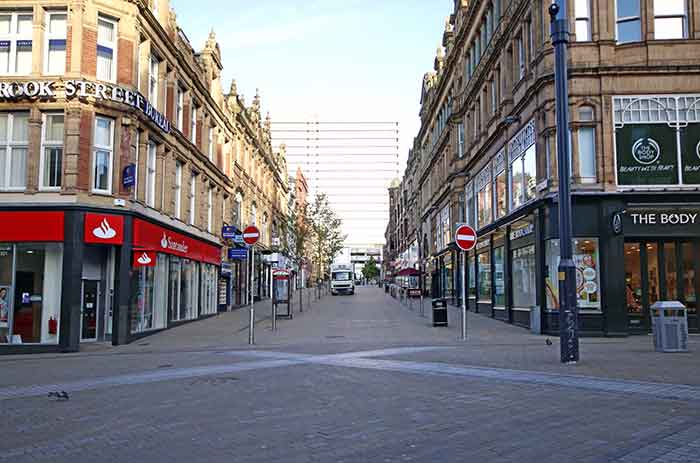In last summer’s budget speech, George Osborne set out his long-term vision of building a “higher wage, lower tax, lower welfare economy” in the UK, promising to give Britain “a pay rise” while also announcing major cuts to welfare spending.
It’s a theme the chancellor is likely to return to again in his Budget 2016 statement next Wednesday, when he is expected to announce further welfare cuts – potentially including the controversial pension reforms which have dominated the headlines in the run-up to the statement – along with more details of the government’s plan to introduce a National Living Wage as of next month.

The budget must focus on expanding devolution to cities like Leeds that have not yet reached deals. Photo: Shutterstock
But for the government to realise its long-term economic vision, it needs to focus on where the majority of wages are generated in this country, and where most welfare spending takes place – in UK cities.
As the recent Cities Outlook 2016 report showed, the UK’s 63 largest cities account for nearly two-thirds of wages earned, and are also responsible for 60% of welfare spending (not including retirement-related benefits) – underlining the importance of supporting and empowering our cities to deliver the government’s economic aims.
However, the report also showed that nearly half of UK cities are currently classified as having ‘low wage, high welfare’ economies, highlighting the size of the economic challenge facing the government.
Crucially, there is a clear and decades-long geography to both productivity and the low wage, high welfare economy – with almost all the “high wage, low welfare” cities located in the South East of England, while most places with low wages and high welfare spending are in the North and the Midlands.
It’s therefore clear that any policies designed to cut welfare and boost productivity and wages will need to vary across the country. Our weaker city economies need support to boost growth, while more successful places need help to deal with the costs of growth – such as high housing demand, which is pushing up welfare spending.
There is no quick fix to these issues, something the government has recognised with its commitment to devolution deals and a long term programme of investment in the Northern Powerhouse, but there are further steps the government can take in the Budget to help drive prosperity and help UK cities to realise their economic potential.
Keep devolution deals for economic growth focused on city regions, and complete the coverage of our largest cities
Understandably there have been calls for devolution to rural as well as urban areas. But if the primary aim of devolution is to improve the economic performance of the national economy as rapidly as possible, then the ever-growing importance of cities means that the devolution agenda must retain an urban focus if it is to help achieve that higher wage, lower welfare economy. In particular, that means focusing on securing devolution deals for major cities like Bristol and Leeds, which are yet to agree a deal.
Reform the business rates system to support economic growth
The government’s decision to devolve business rates was very welcome, and will incentivise local leaders to tackle the key drivers of economic growth in their area. But significant reforms of the business rates system are needed to maximise the potential benefits from devolution of this tax. That includes, for example, reforming the appeals process – with delays in the approval process currently resulting in up to 25% of business rates being on hold in local authorities across the country.
Use devolution to increase the rate of housebuilding in our most successful cities
The economic growth of our most successful cities in recent years has fuelled demand to live within them. But because the supply of houses has not matched this increase in demand, house prices have risen sharply within them. Not only does that price people out of living in these places, it also pushes up the housing benefits bill.
There are two main ways that the government could empower and incentivise cities to build more homes where we need them. First, increasing the Housing Revenue Account borrowing cap would help to finance more public sector house building in cities across the country. Second, the chancellor could create more incentives for local authorities to build homes, either through increasing the size of the soon-to-be-reformed New Homes Bonus or by devolving stamp duty.
The chancellor has already warned the UK faces of a “dangerous cocktail” of economic risks, including tension in the Middle East, slowing growth in China and lower oil prices. But a Budget that builds on devolution deals and the Northern Powerhouse and recognises how to make the most of our city regions would go a long way in ensuring that the UK is in the strongest economic position possible to withstand the challenges ahead.


















